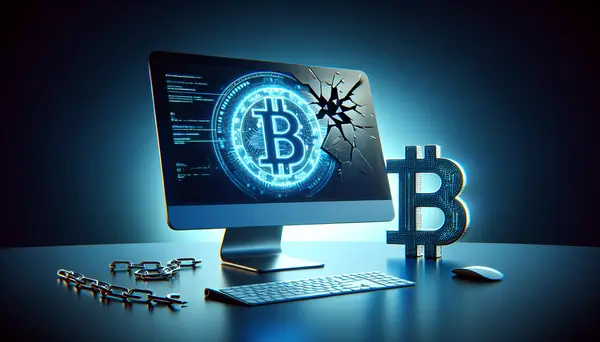Table of Contents:
Introduction: Understanding Bitcoin Security
Imagine being part of a financial environment that is both secure and offers freedom from conventional banking systems. This was the dream that led to the inception of Bitcoin. But can the dream turn into a nightmare? Could Bitcoin be hacked? This article aims to delve into the realm of Bitcoin security, providing clarity on whether your Bitcoin assets are truly safe.
Though most people have heard about Bitcoin, many are yet to grasp its complexities fully. Bitcoin's security is a significant aspect of comprehension, considered pivotal by those who use the cryptocurrency. Understanding if Bitcoin can be hacked not only boosts our knowledge about the crypto world but also safeguards our financial future.
The Best Mining Providers at a Glance
» Infinity HashFrom our perspective, currently the best mining provider on the market. With the community concept, you participate in a mining pool completely managed by professionals. A portion of the earnings are used for expansion and maintenance. We've never seen this solved as cleanly anywhere else.
» Hashing24A well-known and established cloud hosting company. With a good entry point and in a good market phase, a good ROI can also be generated with some patience. Unfortunately, we see the durations as a major drawback.
Follow us as we explore the concept of Bitcoin hacking, the tools that ensure the security of Bitcoin, and how Bitcoin is designed to resist such security breaches. This knowledge will give you a better understanding of why Bitcoin has become the poster coin for cryptocurrencies and aid you in making informed decisions in your crypto journey.
Can Bitcoin itself be hacked?
When we ask the question, "Can Bitcoin be hacked?", what we're truly inquiring is—can the foundational technology of Bitcoin be compromised? Bitcoin rests on the blockchain technology, a public ledger containing all transaction data from anyone who uses bitcoin. Transactions are added to "blocks" or the links of code that make up the chain, and each transaction must be recorded on a block.
This blockchain technology, which is decentralized, transparent, and highly secure, makes hacking attempts difficult. For a hacker to alter transaction details or steal Bitcoins directly, they would need to change every block's data after the block they are looking to alter. This task is virtually unfeasurable due to the computational power it would require.
There's also the question of anonymity. While Bitcoin addresses are anonymous, if a hacker attempts to change a block, it could lead to the identification of the malicious party, further increasing the risk involved. In essence, blockchain's design largely protects Bitcoin against hacks directly. However, this is not to say that Bitcoin users are immune to other potential security threats.
Pros and Cons of Bitcoin Security
| Pro | Contra |
|---|---|
| Bitcoin uses cryptographic security features, making it challenging for hackers. | Online wallets used to store Bitcoins can be targeted by hackers. |
| The underlying technology, Blockchain, is inherently secure against hacking attempts due to its decentralized nature. | Cryptocurrency exchanges that deal with Bitcoin are prone to hacking attacks. |
| Any attempts to alter Bitcoin transactions are visible to all participants and thus easily detectable. | Since Bitcoin is a digital asset, it can be susceptible to digital threats like hacking. |
| Bitcoin's network has a lot of computational power backing it, making a 51% attack extremely difficult. | A 51% attack, though difficult, is theoretically possible which could lead to transaction manipulation. |
Blockchain Technology: An Unbreachable Fortress?
blockchain-technology-an-unbreachable-fortress-1690446680.webp" alt="Blockchain Technology: An Unbreachable Fortress?">
Blockchain technology is often described as a highly secure, virtually unbreachable fortress. But what elements give it this reputation? After all, Bitcoin's rise to fame is largely credited to this underpinning technology. Let's delve into the protective mechanisms of the blockchain and why it stands as a formidable fort against hacking attempts.
The most noteworthy security feature of the blockchain technology is its decentralized nature. In the broader context, a decentralized system means no single party has complete control over the entire network. Thus, to carry out a successful hack, one needs to take over more than half of the network's nodes, a feat of colossal proportions.
Also, any alterations to the data of one block in the blockchain require changes to be made on all succeeding blocks. Given the scale of the blockchain network and the rate at which new blocks are added, this task becomes computationally impractical, lending an extra layer of security.
Furthermore, the peer-to-peer mechanism of the blockchain ensures each transaction is verified by participants or nodes in the network before it's recorded on the blockchain. Transparency is another safeguard – all transaction data are visible, making any illicit changes easier to detect.
In summary, these elements render the blockchain technology an improbable target for effective hacks. Still, it's essential to consider other vulnerabilities surrounding Bitcoin, beyond its blockchain.
Bitcoin Wallets: Where The Real Danger Lies
While the Bitcoin network itself is secure, Bitcoin wallets pose a greater risk. Wallets are the digital storage for your Bitcoins, and there are several different types. Each one has its own level of security and susceptibility to being hacked.
Web wallets, for example, are provided by third-party services. These are convenient for quick access and easy transfers, but they are also highly vulnerable due to their online nature. Successful breaches of these services have led to coin theft in the past.
Mobile and desktop wallets offer a balance of convenience and increased security, but they are not invincible. These wallets are only as safe as the device they are stored on. If the device is compromised by malware or a hacker, your Bitcoin assets may also be at risk.
Hardware wallets are the safest option for storing Bitcoins. These offline devices are designed specifically to store cryptocurrencies and protect them with advanced security measures. Even then, users must exercise caution. Phishing attempts or physical theft still present potential threats.
Therefore, while the Bitcoin network itself is robustly secure, the safety of your Bitcoins depends on the precautions you take to secure your wallet. Using strong, unique passwords, enabling two-factor authentication, keeping software up-to-date, and being cautious of phishing attempts can all help protect against these outside threats. These steps, though they may seem basic, can significantly decrease your risk of experiencing a Bitcoin hack.
History of Bitcoin Hacks

In the past, there have been instances of Bitcoin-related breaches, but it's crucial to understand that these did not involve hacking the Bitcoin blockchain itself. Instead, these incidents were the result of malicious attacks on cryptocurrency exchanges and digital wallets, implying vulnerabilities in third-party services, not Bitcoin.
One notorious example is the Mt. Gox hack in 2014, where 850,000 Bitcoins were stolen from the Japan-based Bitcoin exchange. In this case, the breach was due to the exchange's insufficient security measures, not a failure in blockchain technology.
Another significant Bitcoin-related hack was the Bitfinex breach in 2016. This incident resulted in the theft of 120,000 Bitcoins and also occurred due to weak points in the exchange's security protocols.
These events serve as reminders that while the Bitcoin network is robust and secure, the platforms and services associated with it have their own vulnerabilities and require stringent security practices.
Conclusion: How Safe Is Bitcoin?
The security of Bitcoin lies primarily in the robust design of blockchain technology. The decentralization, transparency, and computational challenges of manipulating the blockchain make hacking attempts impractical. However, the instances where Bitcoin was reportedly hacked can be attributed to the vulnerabilities of third-party services, such as online exchanges and wallets, not the Bitcoin blockchain itself.
Hence, the safety of your Bitcoins relies significantly on the measures you take to secure them. Protecting your private keys, using secure wallets, and being cautious of the platforms you utilize to buy, sell, or store your Bitcoins is essential. It's evident that while Bitcoin's design makes it secure, the final responsibility of safeguarding your Bitcoin assets lies with you.
Preventing Bitcoin Hacks: User Responsibility

While Bitcoin's inherent security is robust, it doesn't exempt users from taking additional steps to safeguard their Bitcoin assets. Bitcoin's security lies as much in the users' hands as it does in its blockchain technology.
Firstly, choosing your wallet wisely is fundamental to your Bitcoin's security. As mentioned earlier, hardware wallets provide the highest security level, although they require a bit of an investment. Regardless of your chosen type, regularly updating your wallet software can go a long way in maintaining security.
Next, users should always secure their private keys. These keys give you access to your Bitcoin. If someone else gets hold of them, they can easily control your Bitcoins. Therefore, protect your private keys just as you would protect valuable physical property.
Danger lurks not only in the crypto-sphere but also in the form of social engineering scams. These scams aim to trick you into handing over your details. Do not share your important Bitcoin details with anyone you don't trust completely.
Lastly, using secure and trusted platforms for your transactions can also prevent potential hacks. Before engaging in any transaction, ensure the platform you're using is reputable and uses secure HTTPS connections.
In a nutshell, Bitcoin's security doesn't relieve you of the need to take personal security measures. Remember, the best line of defense against Bitcoin hacks is informed and conscious users!
Conclusion: Is Your Bitcoin Truly Safe?
By now, it should be apparent that the security threat for Bitcoin doesn't primarily stem from the architecture of its blockchain technology, but rather from the external elements interacting with it, such as wallets, exchange platforms, and even users' personal actions. Hackers mostly target these, capitalizing on their vulnerabilities. A successful attack on these 'soft spots' doesn't mean that Bitcoin was hacked; rather, an external element became the victim, leading to the loss of the held Bitcoins.
Practicing strict digital hygiene reduces these risks significantly. Keeping your wallet's private key private, refraining from sharing sensitive data, using two-factor authentication, investing in secure hardware wallets for large amounts of Bitcoins, and keeping software up-to-date can all serve as strong fortresses against security breaches.
In essence, while the Bitcoin protocol remains highly secure owing to its cryptography and underlying blockchain technology, the key to your Bitcoin's safety rests substantially in your hands!
Frequently Asked Questions
Can Bitcoin be hacked?
It's not easily possible to hack Bitcoin itself because it's based on blockchain technology, but Bitcoin exchanges or individual wallets could be vulnerable if they don't have robust security measures in place.
What makes Bitcoin safe from hackers?
Bitcoin uses cryptographic technology, making it difficult to alter or interfere with the system. Additionally, its decentralised nature means there's no central point for hackers to target.
What happens if my Bitcoin wallet is hacked?
If your Bitcoin wallet is hacked, you may lose your bitcoins. It's vital to keep your wallet and private key secure, and consider protecting them with additional security like two-factor authentication.
How to secure my Bitcoins from hackers?
To protect your Bitcoins, ensure you use a secure wallet that encrypts your private keys, keep your software updated, use strong and unique passwords, and avoid using public Wi-Fi networks when transacting with your Bitcoin.
Can a lost Bitcoin be recovered?
If Bitcoins have been sent to an incorrect address or the private key has been lost, there is less likelihood of recovery. However, if you have lost access to your wallet, but know your private key, recovery may be possible.









